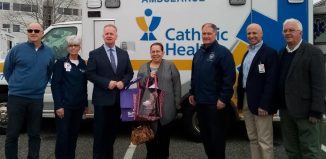Local doctors address how to handle a mental health emergency

Long Island residents have taken CPR classes and learned lifesaving basics to help others with injuries through programs like “Stop the Bleed.”
But what about mental health emergencies?
Those may be more difficult to diagnose or understand, particularly for people who may not know the person in emotional distress.
While Suffolk County Police Department officers with specialized training, support service organizations like Diagnostics, Assessment and Stabilization Hub (known as DASH) and Family Service League, and mental health care workers are available to help, doctors offered suggestions for people who would like to provide assistance for a friend, coworker or relative while awaiting professional assistance.
Dr. Wilfred Farquharson IV, a licensed psychologist and director of the Child and Adolescent Psychiatry Outpatient Clinic at Stony Brook Medicine, helped create a two-page patient education sheet titled “Mental Health Emergency Response Guidance Sheet — Knowing Your Options.”
The guide provides suggestions on how to respond to a variety of emergencies, starting with lower level crises, which could include a change in mood or side effects from a medication that is not dangerous to a person’s health.
The options in that case are to contact a mental health provider to schedule an appointment, to use a safety plan or to schedule an urgent visit with a primary doctor.
In situations in which a person is destroying property, is threatening physical injury and is not in a position for a safe transport, the guide suggests calling 911.
To ensure effective help from emergency responders, the guide urges people to go to Smart911 to complete a profile for the household.
Additionally, people who call 911 should indicate that there is a mental health emergency. The person making the call should be prepared to offer the person’s name and location, the reason for the call, the person’s diagnosis (if known), things that upset the person, such as yelling at them or getting too close, things that might help soothe the person, and special considerations.
While people are waiting for first responders, they can try to deescalate the situation, using tools similar to the ones professionals practice.
“A lot of what we do is give the person space,” Farquharson said. “We show them our hands, with open palms, and let them know we’re not trying to be a threat. We don’t say too much. We allow the person to talk, as long as they’re being safe. We allow them to yell.”
Neutral tone
Dr. Adnan Sarcevic, chairman of the Psychiatry Department at Huntington Hospital, also urges people to provide “as much privacy as possible” for someone in distress.
Sarcevic recommended that supportive family, friends or community members be empathetic without being judgmental.
“Keep your tone and your body language neutral,” Sarcevic said. He urges people to remain calm and friendly.
People can help deescalate situations by acknowledging that someone else’s feelings are important and indicating that crying or being angry is okay.
Taking a cue from the person in distress can also help. If a person stops talking, “let him or her be there in silence. Let them reflect,” Sarcevic said.
Additionally, the Huntington Hospital doctor urged people to respect the personal space of someone who is struggling.
As far as his list of “don’ts,” Sarcevic said people shouldn’t use judgmental language or wag their fingers.
“Don’t ask, ‘Why’ or ‘How could you do that?’” Sarcevic advised.
Other resources
The Suffolk County Police Department implemented a 911 call diversion pilot program in 2021 which allows Emergency Complaint Operators to divert crisis calls, when considered safe, to the Crisis Hotline at Family Service League.
The SCPD collaborates with Family Service League on a 24-hour crisis hotline as well as a mobile crisis team of mental health professionals that can be deployed 24/7, officials from the SCPD explained in an email.
Additionally, the department said about 20% of SCPD officers are Crisis Intervention Team trained. Someone with that training is always on patrol.
In addition to 911, people can reach out to DASH, which is the Diagnostic, Assessment and Stabilization Hub. A community crisis program with a Mobile Crisis Team for Suffolk residents, DASH is open every hour of every day and offers services for people who have mental health and substance abuse disorders.
For situations in which there are no safety risks, Stony Brook Medicine suggested that DASH is a good option. Residents can call the hotline at 631-952-3333.
Additionally, residents can call the Suicide and Crisis Hotline at 988 at any time.
Dr. Stacy Eagle, director of Psychiatry at St. Charles Hospital, cautioned that what deescalates one person might be different from what helps someone else.
Offering physical comfort to some people may help, while others might prefer to have their own space.
All three mental health professionals said the pandemic has contributed to higher levels of anxiety and depression among the population.
“The pandemic has increased the level of distress for those patients,” Eagle said. The pandemic could be the “stressful hit” that triggers discomfort or a mental health episode.
Farquharson has noticed an increase in the acuity of symptoms for some residents.
The mental health practitioners said the response to a crisis depends on the person involved and the type of problem he or she
is experiencing.
“You have to use [your] judgment”
when dealing with various circumstances, Sarcevic said.
Mental health professionals urged people to develop a plan that includes having phone numbers nearby, for 911, 988, DASH and the Family Service League, among others.
Additionally, doctors suggested people can help by being supportive and being prepared.
Farquharson said people should learn what to do if someone is not feeling well emotionally or mentally when a doctor’s office might be closed.






